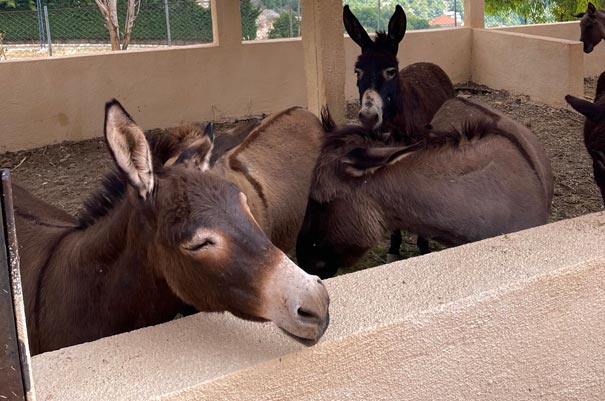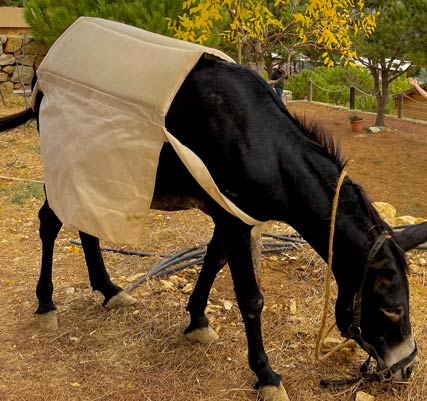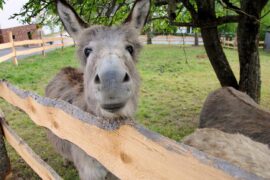Research by Dr. Leanne Proops and Dr. Britta Osthaus from the University of Portsmouth and Canterbury Christ Church University, respectively, revealed that donkeys are less tolerant to the cold than horses. Their research found that Donkeys start to seek shelter when the temperature falls below 57.2°F (14℃). Therefore, temperatures below 57.2°F (14℃) would be too cold for donkeys.
If you live in the northern region of the United States, where average temperatures in winter range from 39.2°F (4℃) to 59°F (15℃), it may be too cold for your donkeys. This can happen because donkeys have long ears to help regulate temperature, but they only have a single coat of hair that is slow to regulate itself to adapt to the climate. Whereas horses’ coats are said to increase by over 200%, adapting to cold and hot temperatures.
Donkeys and cold tolerance
Though donkeys are generally known to be hardy and highly adapted to harsh, semi-arid environments, in reality, they are susceptible to the cold and prefer warmer and dry areas. This happens because donkeys, unlike horses, have thinner coats, preventing them from effectively regulating heat in their body.
The comfortable temperature range at which organisms maintain their core temperature is called the Thermal Neutral Zone (TNZ). In this zone, organisms can regulate heat in their bodies by increasing or decreasing their metabolism to suit the environment. When the temperature drops and organisms can no longer produce enough heat in their bodies to keep them warm, they enter the Lower Critical Temperature (LCT), which is too cold for them.
According to Dr. Proops’ study, the LCT for Donkeys varied from 41°F (5°C) to 59°F (15°C). In this temperature zone, donkeys moved toward their shelters for warmth and comfort. Donkeys have a higher LCT than horses and mules, making them more vulnerable to the cold and needing attention in the winter months.
Though this is the temperature range understood through experiments predominantly in the UK, due to a lack of research in the US, these temperatures might not match your experiences. Donkeys that live in warmer areas will have a lower cold tolerance than those in colder regions, so it’s best to judge how cold your donkeys are by observing how they behave.
How to know when your donkeys are cold?
A tell-tale sign of a cold donkey is when they shiver. If your donkeys are cold, they will let you know before the situation worsens by shivering, seeking shelter, or braying at night.
Paying attention to these signs by assessing the environment will help you give your donkeys the necessary attention. Side note, a donkeys’ bray is an attempt from them to communicate their various needs. Paying attention to it can help you understand your donkeys better.
How to keep your donkeys warm?
The key to keeping your donkeys warm is to provide a dry area away or shielded from the wind. So, some of the few things you can do to ensure that your donkeys are dry and are not in the face of winds outdoors are:
- Create windbreaks to ensure that there are no strong winds on your pastures.
- Ensure that your paddocks are well-drained, so they dry fast after rain or snow.
- Give your donkeys shelter to gather or escape from strong winds and the cold. The shelter should have at least three walls and a sloping roof. A sloping roof prevents snow build-up, which helps keep the shelter warm.
- A source of water is essential. Donkeys can endure for 3 days without water but providing a source of fresh water helps donkeys be hydrated, comfortable, and stress-free. Side note, if you rear in a place where sub-zero temperatures persist, using rubber buckets instead of metal or plastic ones to store water for your donkeys will help keep the water unfrozen for longer.

When indoors, donkeys like to sleep and stay in a safe environment. If they’re uncomfortable, they will sleep lightly while standing up. It’s also important to note that whatever you may do to make your donkeys comfortable, there might be some donkeys that don’t receive it well but do not be overly concerned about it. So, what else can you do to make your donkeys comfortable?
- Provide them with a dry, warm, and well-ventilated space to sleep in. Having straw bedding will help insulate them from the cold floor. But be mindful of the time they spend inside and change the bedding often if they are indoors for a long time.
- Provide them with a constant source of straw to chew on to maintain their energy.
- Provide them with fresh water to keep them hydrated and ensure that the water buckets don’t spill to dampen their shelters.
- If you find it necessary, provide extra warmth in the shelter by bringing in infrared lamps.
Putting a blanket on your donkey
This is a method where you put blankets on your donkeys to keep them warm. This method has many reservations as it interrupts a donkey’s shedding cycle, so when should you do it?

Not all donkeys need to be blanketed. For example, a young donkey may be more resistant to the cold, but older donkeys prefer to be warmer. Therefore, if you have cold older donkeys, get them a blanket. If your donkey shows no signs of being cold, don’t be quick to blanket them, as it will interrupt their shedding cycle. Their shedding cycle is essential in regulating heat and blanketing your donkeys will not help them develop a tolerance to the cold.
But, for donkeys born in winter, have had surgery or were sick and are recovering, get them a blanket as it will help them be more comfortable. It will help them spend less energy generating heat and more energy recovering.
Conclusion
Donkeys are more vulnerable to the cold than horses and mules and prefer being in dry and warm areas. Temperatures below 57.2°F (14℃) may be too cold for donkeys. You can provide proper care to them by making their shelters more comfortable and ensuring no wind is blowing in your pastures. Though donkeys are sturdy animals, they require adequate care in the winter as they cannot regulate heat as effectively as horses and mules.

![How Cold is Too Cold for a Donkey? [Plus Tips to Keep Them Warm] How-Cold-is-Too-Cold-for-a-Donkey](https://donkeyonfarm.com/wp-content/uploads/2022/09/How-Cold-is-Too-Cold-for-a-Donkey.jpg)

![How to Get Rid of Flies on Your Donkey? [Plus Prevention Methods] How to Get Rid of Flies on your Donkey](https://donkeyonfarm.com/wp-content/uploads/2022/05/How-to-Get-Rid-of-Flies-on-your-Donkey-270x180.jpg)
![Should Donkeys Be Stabled at Night? [With Alternatives to a Stable] Should-donkeys-be-stabled-at-night](https://donkeyonfarm.com/wp-content/uploads/2023/04/Should-donkeys-be-stabled-at-night-270x180.jpg)
![How Much Can Donkeys Carry? [Avoid Burdening] How-much-can-donkeys-carry](https://donkeyonfarm.com/wp-content/uploads/2022/04/How-much-can-donkeys-carry-270x180.jpg)

1 Comment
Why do donkeys stand like they are frozen in cold weather only moving their head once in awhile?